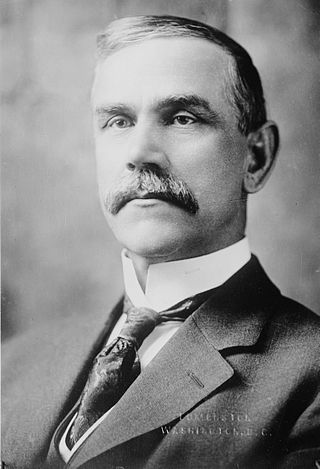
Reed Smoot was an American politician, businessman, and apostle of the Church of Jesus Christ of Latter-day Saints. First elected by the Utah State Legislature to the U.S. Senate in 1902, he served as a Republican senator from 1903 to 1933. From his time in the Senate, Smoot is primarily remembered as the co-sponsor of the 1930 Smoot–Hawley Tariff Act, which increased almost 900 American import duties. Criticized at the time as having "intensified nationalism all over the world" by Thomas Lamont of J.P. Morgan & Co., Smoot–Hawley is widely regarded as one of the catalysts for the worsening Great Depression.

Thomas Spencer Monson was an American religious leader, author, and the 16th President of the Church of Jesus Christ of Latter-day Saints. As president, he was considered by adherents of the religion to be a prophet, seer, and revelator. Monson's early career was as a manager at the Deseret News, a Utah newspaper owned by the LDS Church. He spent most of his life engaged in various church leadership positions and public service.
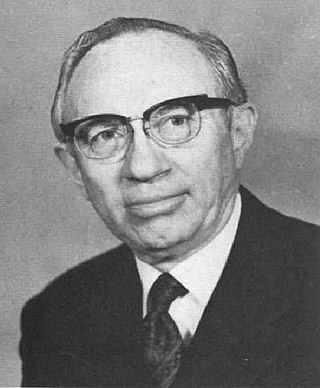
Gordon Bitner Hinckley was an American religious leader and author who served as the 15th President of The Church of Jesus Christ of Latter-day Saints from March 1995 until his death in January 2008 at age 97. Considered a prophet, seer, and revelator by church members, Hinckley was the oldest person to preside over the church in its history until Russell M. Nelson surpassed his age in 2022.

Robert Foster Bennett was an American politician and businessman. He was a United States Senator from Utah as a member of the Republican Party from 1993 to 2011. Bennett held chairmanships and senior positions on a number of key Senate committees, including the Banking, Housing and Urban Affairs Committee; Appropriations Committee; Rules and Administration Committee; Energy and Natural Resources Committee; and Joint Economic Committee.
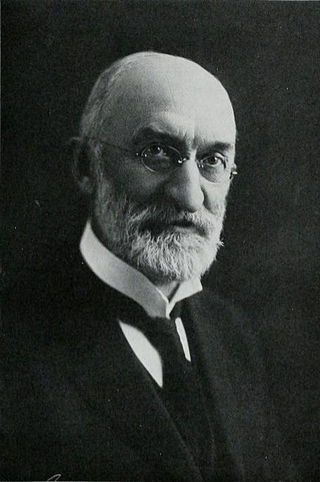
Heber Jeddy Grant was an American religious leader who served as the seventh president of the Church of Jesus Christ of Latter-day Saints. Grant worked as a bookkeeper and a cashier, then was called to be an LDS apostle on October 16, 1882, at age 25. After the death of Joseph F. Smith in late 1918, Grant served as LDS Church president until his death.
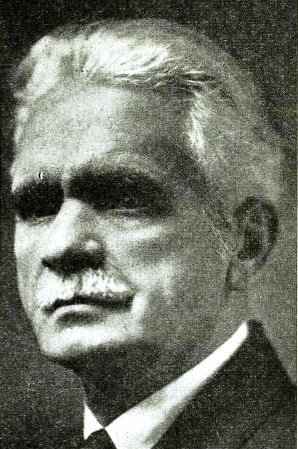
Brigham Henry Roberts was a historian, politician, and leader in the Church of Jesus Christ of Latter-day Saints. He edited the seven-volume History of the Church of Jesus Christ of Latter-day Saints and independently wrote the six-volume Comprehensive History of the Church of Jesus Christ of Latter-day Saints. Roberts also wrote Studies of the Book of Mormon—published posthumously—which discussed the validity of the Book of Mormon as an ancient record. Roberts was denied a seat as a member of United States Congress because of his practice of polygamy.

Wallace Foster Bennett was an American businessman and politician. A member of the Republican Party, he served as a US Senator from Utah from 1951 to 1974. He was the father of Bob Bennett, who later held his father's seat in the Senate.

Orson Pratt Sr. was an American mathematician and religious leader who was an original member of the Quorum of the Twelve Apostles of the Church of Christ. He became a member of the Quorum of the Twelve of the Church of Jesus Christ of Latter-day Saints and was a leading Mormon theologian and writer until his death.

Marion George Romney was an apostle and a member of the First Presidency of the Church of Jesus Christ of Latter-day Saints.

Richard Roswell Lyman was an American engineer and religious leader who was an apostle in the Church of Jesus Christ of Latter-day Saints from 1918 to 1943.

Brigham Young Jr. served as president of the Quorum of the Twelve Apostles of the Church of Jesus Christ of Latter-day Saints from 1899 until his death. His tenure was interrupted for one week in 1901 when Joseph F. Smith was the president of the Quorum.

Moses Thatcher was an apostle and a member of the Quorum of the Twelve Apostles in the Church of Jesus Christ of Latter-day Saints. He was one of only a few members of the Quorum of the Twelve to be dropped from the Quorum but to remain in good standing in the church and retain the priesthood office of apostle.

Zina Diantha Huntington Young was an American social activist and religious leader who served as the third general president of the Relief Society of the Church of Jesus Christ of Latter-day Saints from 1888 until her death. She practiced polyandry as the wife of Joseph Smith, and later Brigham Young, each of whom she married while she was still married to her first husband, Henry Jacobs. She is among the most well-documented healers in LDS Church history, at one point performing hundreds of washing, anointing, and sealing healing rituals every year. Young was also known for speaking in tongues and prophesying. She learned midwifery as a young girl and later made contributions to the healthcare industry in Utah Territory, including assisting in the organization of the Deseret Hospital and establishing a nursing school. Young was also involved in the women's suffrage movement, attending the National Woman Suffrage Association and serving as the vice president of the Utah chapter of the National Council of Women.

Jonathan Golden Kimball was a leader of the Church of Jesus Christ of Latter-day Saints, serving as a member of the First Council of the Seventy from 1892 until his death in 1938. He is considered one of the most colorful and beloved of the church's general authorities. In the years since his death, "Uncle Golden" has become a near legendary character among church members, possibly comparable to what Will Rogers or Mark Twain are to the general American public.

Frank Jenne Cannon was the first United States Senator from Utah, who served from 1896 to 1899.
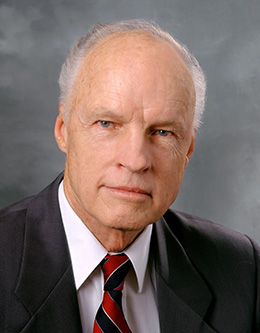
Truman Grant Madsen was a professor of religion and philosophy at Brigham Young University (BYU) and director of the Brigham Young University Jerusalem Center for Near Eastern Studies. He was a prolific author, a recognized authority on Joseph Smith, and a popular lecturer among Latter-day Saints. At one point, Madsen was an instructor at the LDS Institute of Religion in Berkeley, California.
Bruce Clark Hafen is an American attorney, academic and religious leader. He has been a general authority of the Church of Jesus Christ of Latter-day Saints since 1996.

Hugh Wallace Pinnock was a general authority of the Church of Jesus Christ of Latter-day Saints from 1977 until his death.

Possibly as early as the 1830s, followers of the Latter Day Saint movement, were practicing the doctrine of polygamy or "plural marriage". After the death of church founder Joseph Smith, the doctrine was officially announced in Utah Territory in 1852 by Mormon leader Brigham Young. The practice was attributed posthumously to Smith and it began among Mormons at large, principally in Utah where the Church of Jesus Christ of Latter-day Saints had relocated after the Illinois Mormon War.

Franklin Snyder Richards was the general counsel for the Church of Jesus Christ of Latter-day Saints in the late-19th and early-20th century. He was closely connected with the defense against charges of polygamy of many leading LDS Church figures.

















